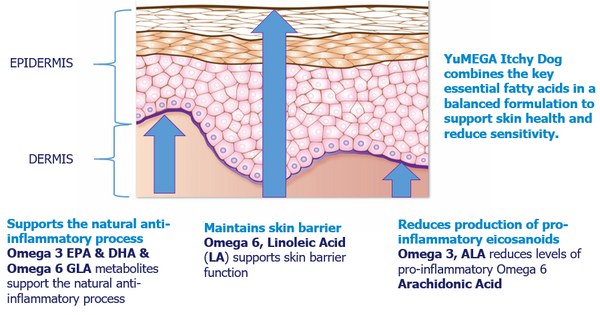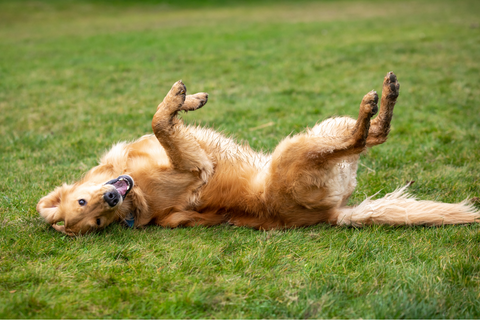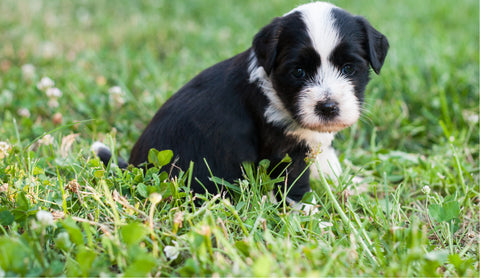
Doggy dandruff and how to help
A gorgeous, glossy coat usually indicates a healthy animal. So should you worry if your dog has dandruff? We get the lowdown from our vet on when to take your pooch’s dandruff seriously and which bonkers ‘treatments’ to avoid.
All that scratching is making us itch
“Dandruff is simply dead cells shedding from your dog’s skin,” says Rachel Hylton, our resident vet at Lintbells.
There could be a variety of reasons behind those dry pesky flakes. If your dog’s been cosying up to the radiator all winter, all that lovely radiant heat could reduce the amount of moisture in the air as well as in your dog’s coat and skin. Or your dog might be allergic to house dust mites or pollen.
It could also be a case of a lack of grooming. When you brush your dog’s coat, you help distribute the skin’s natural oils, which will help it look healthier and glossier.
Puppy dandruff: it’s just a stage
Another cause of doggy dandruff resolves itself over time. “Puppies tend to suffer more from dandruff than adult dogs because they have under-developed sebum glands,” says Rachel. “It’s usually nothing to worry about. When your puppy gets to about four months old, those glands will become more active, and the dandruff should sort itself out.”
Breeds that are prone to dandruff

Interestingly, some breeds are more susceptible to excessive sebum than others, particularly Cocker Spaniels, West Highland White Terriers, Bassett Hounds and Doberman Pinschers.
However, as you can imagine, it’s easier to spot dandruff on a Doberman than on a Westie.
When to worry
Most of the time, dog dandruff is unlikely to be a problem. However, you’re right to be concerned if:
- Your dog’s skin is red and looks inflamed
- Your dog’s scratching excessively
- Your dog is chewing or licking its skin more than normal.
In these circumstances, “Take your dog to the vet,” says Rachel. “It might be a sign of something more serious such as a skin infection or problems with your dog’s hormone or immune system. But if it’s just dandruff and nothing else is going on, I’d be a bit more relaxed about it.”
Vet insight. Impress your vet by talking about signs, not symptoms. “With animals, the correct term is signs, rather than symptoms,” says Rachel.
Walking dandruff
One cause of grey-white colour ‘dandruff’ is the Cheyletiella mite. Your vet can take a quick Sellotape sample and see the mite moving under their microscope to make a diagnosis.
The good news is that these fur-dwelling critters are easy to eliminate. According to Rachel: “Almost any flea or mite product will kill them off.”
Boost your dog’s diet with fatty acids
If you’ve ruled out any underlying problem, Lintbell’s YuDERM range is renowned for containing a range of vital nutrients that will boost the health, shine and condition of your dog’s coat.
YuDERM was the first product that Lintbells created. We developed it specifically to help improve show dogs’ skin and coat so they’d look their best in the ring. As with all our products, YuDERM is the result of a great deal of research and experimentation. It’s carefully balanced and contains the precise ratio of different types of Omega 3 and Omega 6 that will make a difference.
YuDERM Itchy Dog is packed with essential fatty acids that support skin health and reduce sensitivity. It contains:
- High levels of Omega 3 and Omega 6 from Golden Flax and Starflower seeds
- The finest Norwegian salmon oil to soothe sensitive skin
- Vitamin E from natural plant sources to mop up free radicals.

Ditch these dodgy ‘treatments’
Finally, be careful when you’re searching for advice online. Ask any search engine about treatments for dog dandruff and you’re liable to come up with truly random advice such as using a lime juice rinse, apple cider rinse or mouth wash.
Rachel has a word of warning if you’re tempted to try any of these off-the-wall ideas. “My concern with lime juice and apple cider is that they’re both really acidic,” she says.
“Whatever you put on your dog’s coat, you run the risk that it’s going to get into their eyes. Would you put cider vinegar in your own eyes? If not, don’t put it anywhere near your dog.”
Get your dog its own shampoo
And just as human mouth wash isn’t good for your four-legged friend, neither is human shampoo. Your dog’s skin has a different pH to human skin and shampoo made for us is much more acidic than products designed for our canine pals.
Human shampoo isn’t good for dogs.
Baby shampoo isn’t good for puppies.
Your dog needs a pup-friendly product.
“There are some lovely oatmeal shampoos available for dogs that are calming and nourishing for their skin,” says Rachel.
The last word on dandruff
To sum it all up, if in doubt, get your dog checked by a vet to make sure there’s nothing more serious going on. And in the meantime, follow the lead of the breeders and vets who trust YuDERM Itchy Dog to calm their dog’s sensitive skin and reduce itching and scratching.








